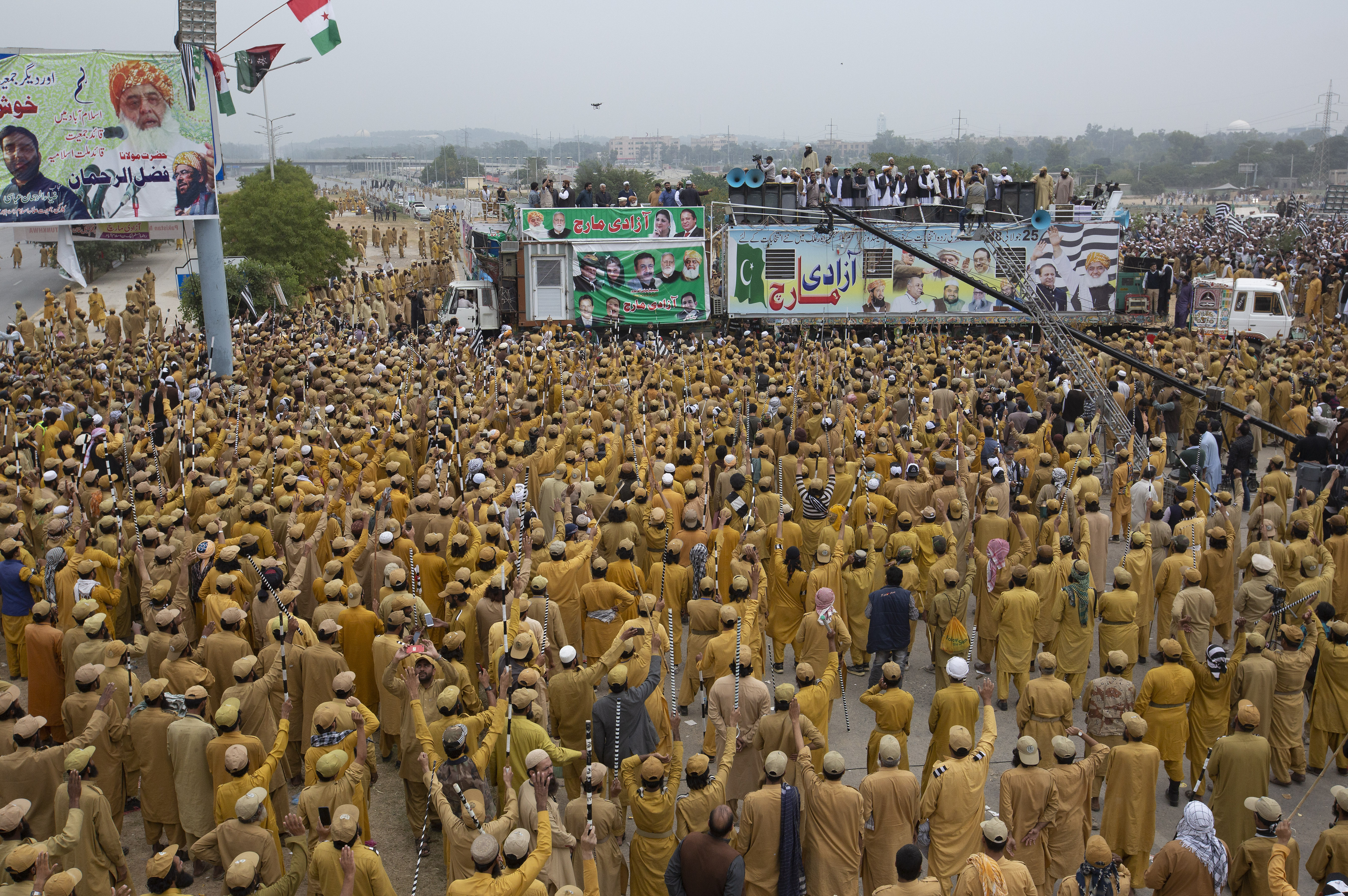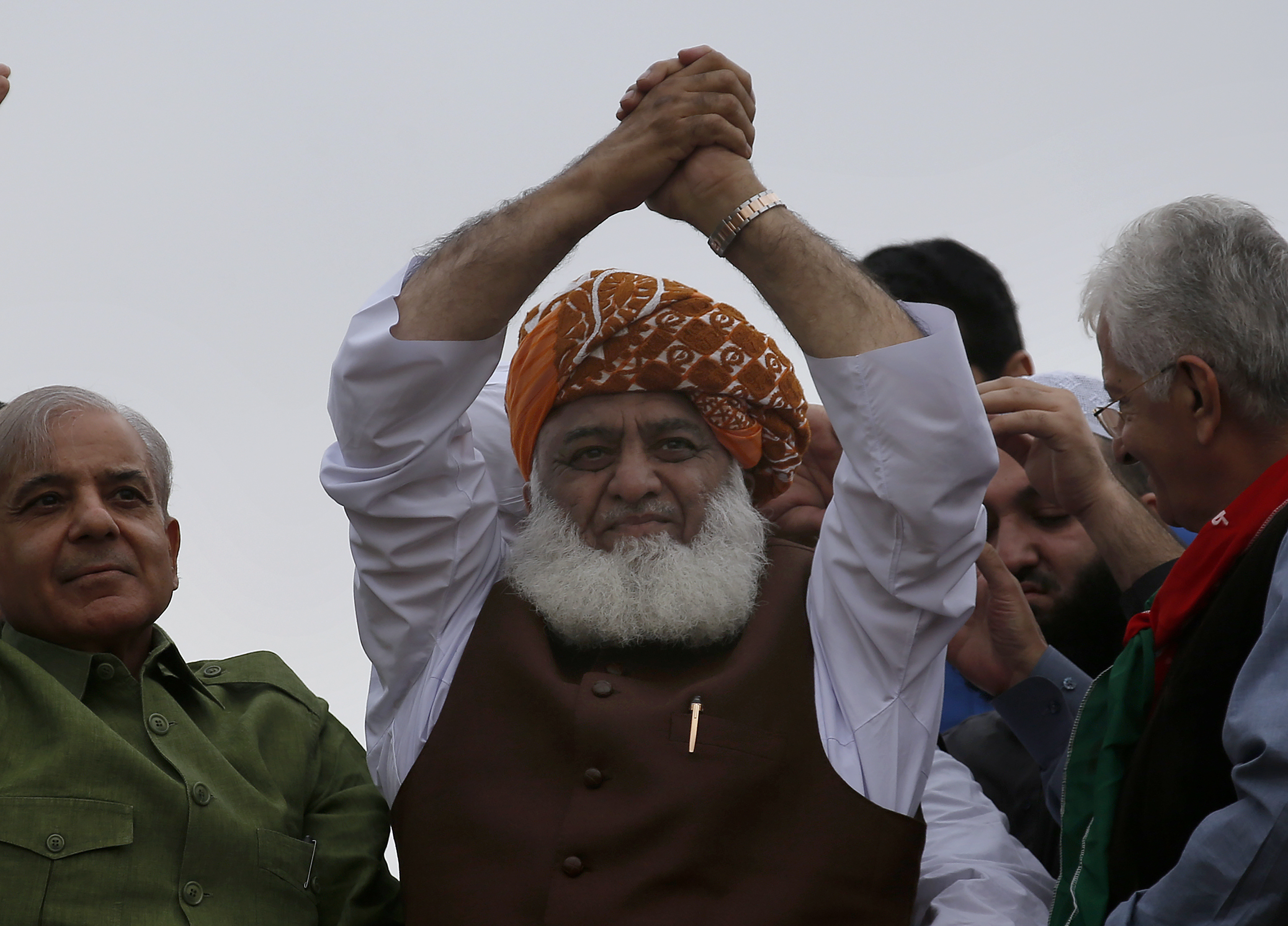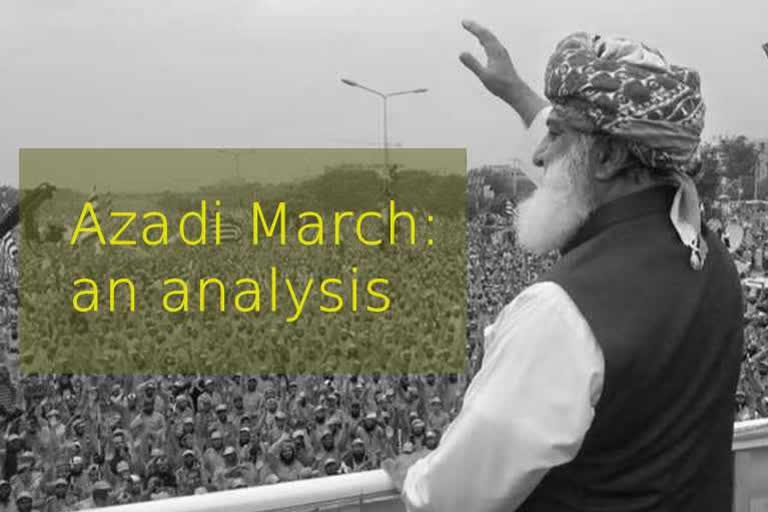Hyderabad: Maulana Fazlur Rehman, leader of Pakistan’s major religious party, the Jamiat Ulema-i-Islam (JUI - F) who is counted as being the most pragmatic and flexible political survivor in a very volatile domain led an ‘Azadi (freedom) March’ against Prime Minister Imran Khan on October 27 and at peak, it was estimated that over 200,000 followers had congregated in Islamabad. The Maulana’s demand was that PM Khan had to resign since the 2018 election that catapulted Imran to power, the JUI leader alleged, was rigged.

On Saturday (Nov 9) the Azadi March had completed two weeks and the stalemate continues. The Imran Khan government has entered into inconclusive negotiations with the Rehbar Committee of opposition interlocutors team and the inclement weather – heavy rains and cold nights – has seen some local participants in the march returning home. Domestic commentators have described the march as having ended in a damp squib and have dismissed the challenge posed by Fazlur Rehman but a more objective analysis would suggest otherwise.
Currently, Pakistan’s main political parties, the PML-N (Pakistan Muslim League – Nawaz) and PPP (Pakistan Peoples Party) are in different states of disarray with former PM Nawaz Sharif and former President Asif Zardari indicted on charges of corruption. Furthermore, Mr Sharif is critically ill and has been released from jail with reports suggesting that he may be flown abroad for medical treatment. It is also evident that there is an undercurrent of a leadership tussle within the PML-N between the brother and daughter of Nawaz Sharif. The assessment is that Mr Sharif’s daughter Maryam will assume leadership of the PML-N at the appropriate time.
Also read: Azadi March: Pakistan cleric takes on Imran Khan
The PPP is also in a state of uneven political consolidation. The senior Zardari who also has health issues is under the scanner on charges of financial impropriety while holding high office. His son Bilawal Bhutto, on whom the political mantle of his mother Benazir and grandfather Zulfiqar Ali Bhutto has fallen, is slowly restoring the credibility and reach of the PPP within the constraints of the tumultuous politics of Pakistan now carefully managed by the army GHQ in Rawalpindi.

It is in this context that Fazlur Rehman has spotted an opportunity to not only establish his relevance in the prevailing political landscape of Pakistan but also settle scores with his arch provincial rival – Imran Khan. It merits recall that Rehman had been appointed as the Ameer of the JUI as far back as 1980 after his father’s demise when he was just 27 years of age and the district of Dera Ismail Khan in the Khyber Pakhtunkhwa (KP) province was his bastion – one that he had inherited from his father. Rehman also has a base among the Pashtun areas in the Balochistan province.
Also read: Islamabad wears deserted look as 'Azadi March' enters city
In contrast, Imran Khan joined politics only in 1996 when he started his party the PTI (Pakistan Tehreek-e-Insaf) and in a relatively short period, emerged as the more credible political entity in KP. To add insult to injury, in the 2018 national election, Rehman and his party were roundly defeated at the polls for the first time and the relative newcomer, Imran Khan had ousted the erstwhile lion of KP.
Thus since July 2018 when Khan won the national election and later assumed office as PM of Pakistan with visible help and endorsement from Rawalpindi and the men in khaki – Fazlur Rehamn has mounted an attack on the government in Islamabad and accused Khan of being in collusion with the Jewish lobby, the west in general and India to boot!
Also read: Fazlur Rehman to continue stir till Imran Khan resigns
Taking a leaf from Imran Khan’s own book, when the latter led a similar march against then PM Nawaz Sharif in 2016, the Rehman led JUI and its madrasa student base was able to rattle the government in Islamabad but not enough to unseat the Prime Minister.
Pakistan is currently under considerable international scrutiny for its role in supporting terror groups and the more recent FATF (Financial Action Task Force) findings have kept it in the grey list – a rebuke that the Pakistan army cannot ignore. Thus allowing or endorsing further political instability would add to the global anxiety about Pakistan’s sullied image and the ability to manage its nuclear weapons and hence the conjecture that the Pak army signalled that Fazlur Rehman could go thus far – and no further by way of laying siege to Islamabad.

Within Pakistan, there are rumours galore that the three-year extension given to General Bajwa has led to resentment among the senior generals waiting to go up the ladder and that some of them have encouraged Rehamn to go down the Azadi March route – but this is speculative.
If indeed the JUI led march does get called off over the next few days, Maulana Fazluir Rehamn would have achieved his main objective – to remain relevant as a force to reckon with in the politics and power-sharing of Pakistan. This is a niche that he has artfully irrigated for decades, wherein despite its modest electoral numbers and electoral base, the JUI-F has ploughed a solo furrow and compelled the major Pakistan political parties to bandwagon with him at the last minute.
There is a local quip that the party which always wins in Pakistan is called JJUN – or jiddan jitte udde naal – which loosely translates as: ‘whoever wins we are with them.’ Come rain or hail, it appears that Maulana Fazlur Rehman has internalized this tenet.
Also read: No compromise with opposition over protest: Imran



